50+ Sample Coffee Franchise Agreement
-
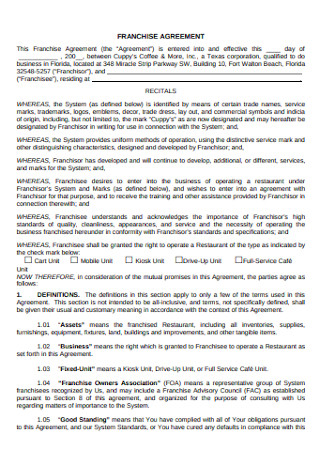
Coffee Franchise Agreement
-
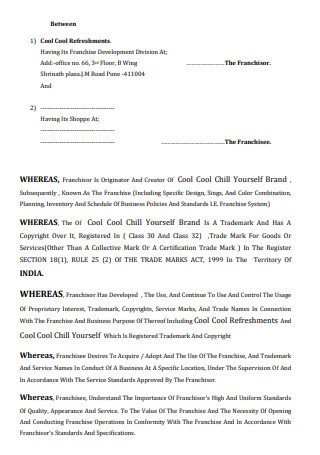
Sample Coffee Franchise Agreement
-
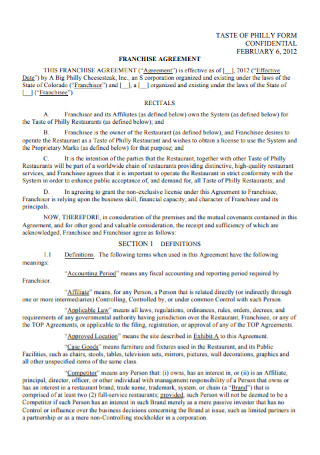
Tasty Coffee Franchise Agreement
download now -
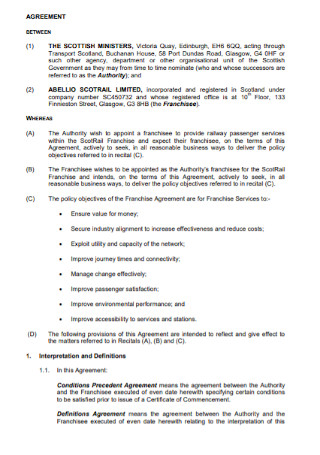
Coffee Scotrail Franchise Agreement
download now -
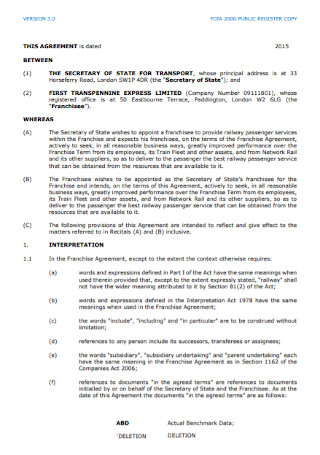
Sample Coffee Franchise Agreement
download now -
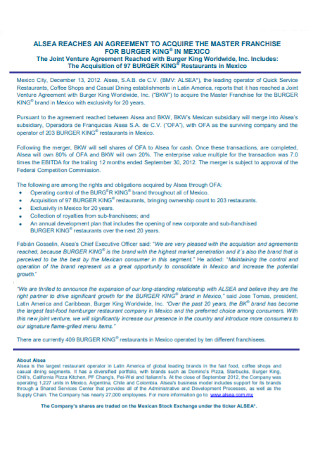
Coffee Master Franchise Agreement
download now -
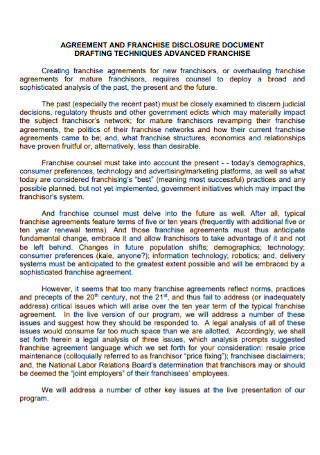
Sample Coffee Franchise Agreement Template
download now -
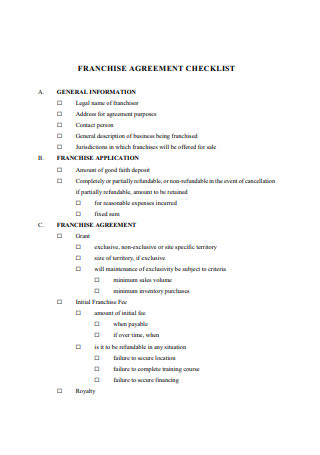
Sample Coffee Franchise Agreement Checklist
download now -
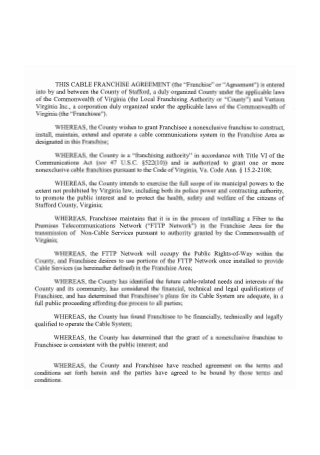
Coffee Franchise Cable Agreement Sample
download now -
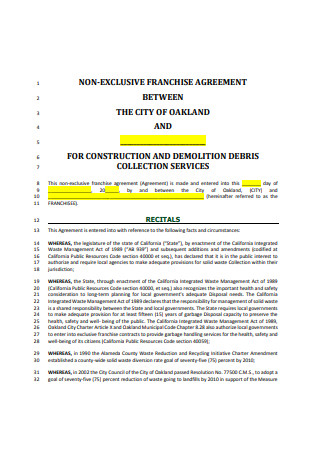
Non-Exclusive Franchise Agreement
download now -
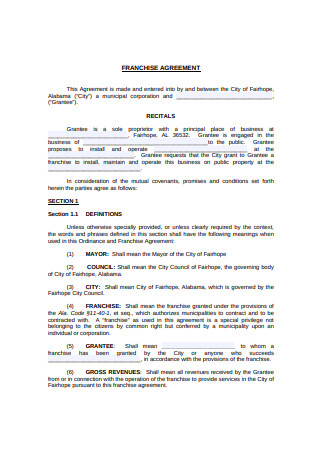
Standard Coffee Franchise Agreement
download now -
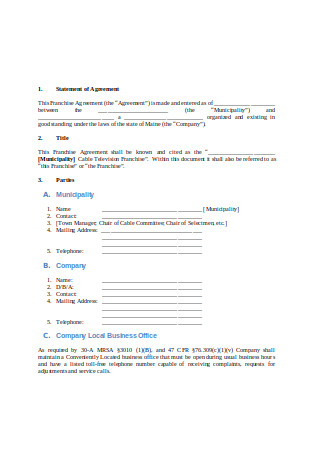
Printable Coffee Franchise Agreement Sample
download now -
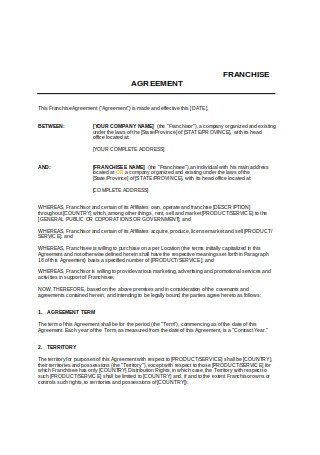
Company Franchise Agreement Template
download now -
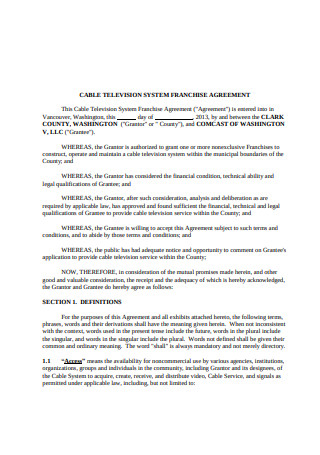
Cable Television System Franchise Agreement
download now -
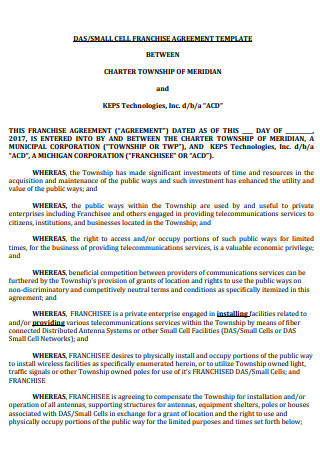
Small Cell Franchise Agreement Template
download now -
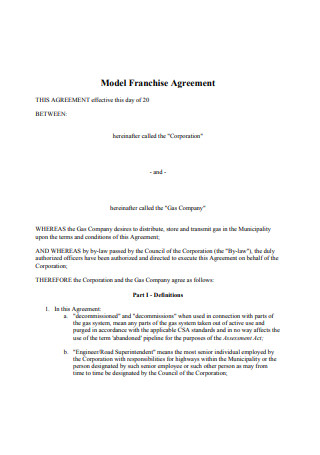
Model Coffee Franchise Agreement Template
download now -
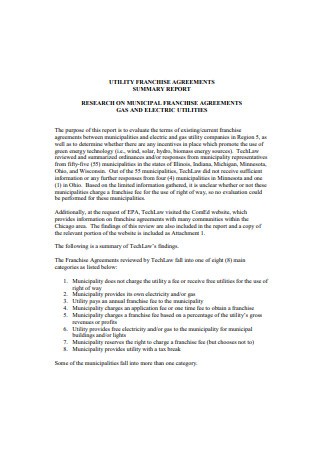
Franchise Agreement Summary Report Template
download now -
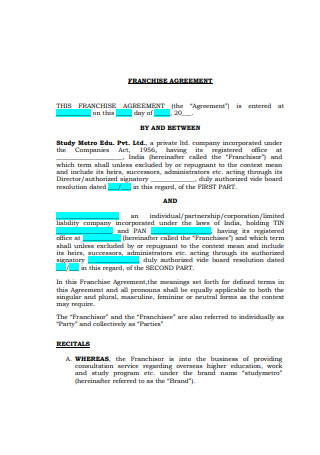
Franchise Agreement Sample
What Is a Coffee Franchise Agreement?
A coffee franchise agreement is a legal contract set between a coffee franchisor and a franchisee. Within the United States, these agreements are known to be enforced at a state level. It is also regulated by the US Federal Trade Commission prior to the franchisee’s signing of the contract. According to Statista, the estimated number of general franchise establishments in the United States was 759,200. In the same source, it stated that $760 billion dollars were outputted that year from franchises alone while employing over 8 million people. Coffee shops, which fall under the category of snack and non-alcoholic beverages, were estimated to be in the number range of 16,494 according to the United States Census Bureau. The numbers in these reliable sources don’t lie and it shows just how valuable franchises are to various industries. All the more reason to get the drafting of a coffee franchise agreement right.
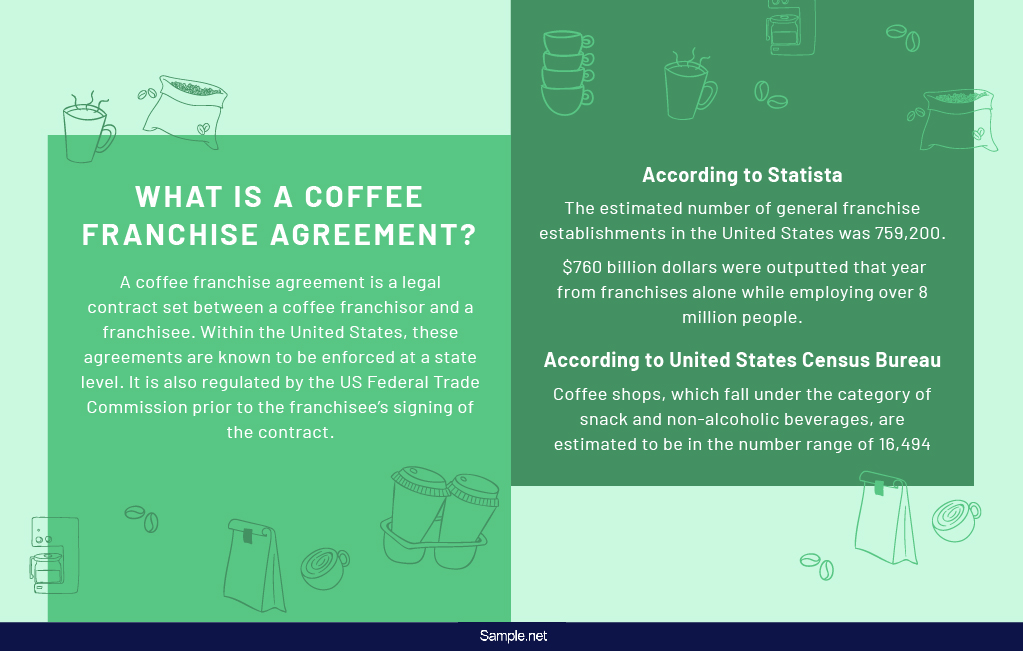
The Elements of a Coffee Franchise Agreement
As you dive into the creation of your coffee franchise agreement, it pays to be able to identify the basic elements involved. For a document like this, there can be more than a dozen elements to take into consideration. The list below should provide more than enough information for whatever needs you may have for the agreement you seek to make.
How to Write a Coffee Franchise Agreement
Now that you have knowledge of the elements, it is time to take what you’ve learned and create an actual coffee franchise agreement. The following steps are guaranteed to help make your experience much easier with its linear progression.
Step 1: Prepare All the Necessary Information
Before you begin writing the franchise agreement, you need to collect the right kind of information to help you with the overall endeavor. First of all, a strong understanding of how your business can succeed is needed. Look into what people know your brand for and why. The second kind of information to look into would be the day-to-day details of your business operations. Be sure that you can determine how your procedures, sales strategies, and business plans may be scaled into guidelines for your franchisees, as well as whatever standards are required of them.
Step 2: Write the Introductory Paragraphs
Keep in mind that introductory paragraphs or clauses referred to as “whereas” clauses are not strictly necessary. However, most franchise agreements still begin with these so that they can provide an accurate description of their business’ nature as well as the agreement’s purpose. It must be noted that none of these paragraphs will include any kind of legally enforceable language. Instead, they operate to help establish just how much value your brand has for potential franchisees and to justify any licensing fees that are needed.
Step 3: Write a Section Dedicated to Definitions
One thing worth noting is that under the rules of contract interpretation, words tend to have their commonly understood definitions unless it is specified otherwise. If you have any words that you have a specific intended meaning needs to be included in a separate section at the start of the agreement. Oftentimes, these words are capitalized in order to differentiate them from any other generic interpretation. Another thing you may want to take note of is the consistent definition of a particular word throughout the agreement in reference to your business. For example, your coffee franchise may be called “Carol’s Coffee.” You can decide that from now on, the word “Coffee” will specifically indicate your trademarked coffee brand and nothing else.
Step 4: Establish the Grant of License
A grant of license is something that provides franchisees rights of operation only to a designated and authorized location. Having this in the franchise agreement allows you to spread out your franchise and avoid any direct competition. For this section, you will specify what rights and licenses you plan on granting to franchisees. The limits of the non-exclusive license will also be described here, along with the listing of any rights reserved. Be sure that you include both an agreement and an acknowledgment from the franchisee that extra locations may be opened, even those at nearby locations. Most cases will already see you and the franchisee already have an agreed-upon location in mind but there may be other details to worry about. One would be the deadline by which this new franchise has to open. Another detail would include the amount paid by the franchisee for the licensing fees and the date when said fees will be due.
Step 5: Define the Agreement’s Specific Duration
The next step to undertake is to set up an initial term for your agreement. You should also provide the necessary procedures for its renewal once the term is drawing to a close. Although it is possible for you to enable automatic renewal, you are also free to require your franchisee to meet specific conditions. Define a specific date for the agreement’s start, which can be the date both parties sign the agreement or on the day the new franchise location opens. Another thing to indicate in this section is the specific amount for the renewal fees should the franchisee decide to renew at the end.
Step 6: Include the Standards for the Facilities
The penultimate step involves setting specific standards regarding facilities set up by your franchisee. Among the factors to include would be where this is to be located, the maintenance, and the condition of the facility. You can create a site selection criteria and perhaps communicate this kind of information in another document. Remember that it is the responsibility of the franchisee to buy a location or come up with a rental application for a lease that will meet your criteria. Once they have done that, they need to obtain written approval from you after the site has been evaluated.
Step 7: Include Miscellaneous Provisions
The last part of creating a franchise agreement would be the inclusion of miscellaneous provisions. Remember that while you might set significant standards for both the operation and control of your franchise, it won’t be you running it. Having an indemnification clause, in this case, can help protect you from any liabilities that your franchisees may find themselves involved with. The purchasing of insurance must also be secured, just like confidentiality and non-compete covenants. Having provisions like these included will ensure that both you and your franchisee will have a much easier time dealing with potential problems down the line.
The Dos and Don’ts of a Coffee Franchise Agreement
As if the elements and steps weren’t enough, there are also a few extra things that you will need to keep in mind. These are just a shortlist of dos and don’ts that can help improve upon your coffee franchise agreement. Take a look at each entry as well as its descriptions and see how exactly this can be of help to you.
Dos
Do ensure that the agreement is flexible.
A standard franchise agreement is meant to be a long-term agreement that will run for more than a decade at least. Having such a long period to do business means that the terms you decide upon now may not be as beneficial in a few year’s time. As the franchisor, you may want to consider drafting an agreement that allows for some flexibility. This is not only for your benefit but for the franchisee of your coffee franchise as well.
Do be as clear as possible with your rules.
Your franchise agreement must include a specific set of rules that the franchisee needs to follow. Otherwise, you are just looking at a deal that could fall apart under the strain of potential misconduct and unwanted behavior. You are the franchisor and that means you need to take control. Being rigid about how business is conducted will not necessarily be good for all involved but there must be certain things that you must not compromise.
Do define the existing relationship between all involved parties.
Remember that franchisees must be treated as the independent contractors that they are. Such a classification in itself already has multiple important implications. For one, independent contractors are not employees nor are they considered agents of the principal. They are in business for themselves and taxes are to be paid individually. They also hire their own and are responsible for their individual business operations. All of that is to be done while also attempting to carry out the agreement that’s been put forth between them.
Don’ts
Do not neglect the insurance coverage.
One of the most important things for any franchisee would be insurance. You never know what may happen, so it helps to be prepared. Getting insurance makes it a lot safer to continue with your business operations. Remember that in each case, the insurance policies are required to name the franchisor as an “additional insured.” This means the franchisor is going to enjoy exactly the same coverage as the franchisee even though he or she is not the one paying for it.
Do not neglect any training and coaching provisions within the agreement.
Those who are well-trained in the ways of managing a franchise will do a lot better than those who are not. Franchisors need to include training provisions within the franchise agreement to ensure that the franchisees are on par in terms of skill and competence. Find time to disclose specific training, seminars, or meetings that are required for the franchisees to undergo. You won’t regret this as your franchisees will come out of it a much better and far more reliable professional.
Do not push through without having an attorney look through the agreement.
As you can see, there is much to take into consideration when it comes to a coffee franchise agreement. Make sure that everything has gone according to a plan by letting your attorney review the agreement. Doing so may help prevent any potential legal entanglements from taking place. Anytime you or your franchisee looks to renegotiate, you should always consult your attorney before making any changes to the agreement at any time at all.
There is definitely a lot of work that will go into this endeavor and we’re just talking about preparing the agreement. For those of you who do not necessarily want to start from scratch, numerous coffee franchise agreement templates can be located online for your benefits. Simply see to it that you edit all the parts that you need to edit before printing it out.
